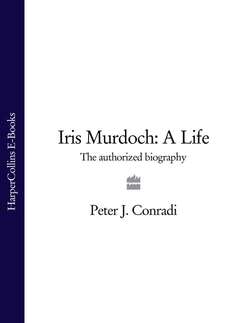Читать книгу Iris Murdoch: A Life: The Authorized Biography - Peter Conradi J. - Страница 38
2
ОглавлениеEnglish is what Iris was accepted into Somerville to study, but she ended by reading Classics. Possibly the English tutor Mary Lascelles, remembered as hard to please, failed to take to Iris. Happily Iris’s brilliant General Paper had won her an Exhibition for merit, and in it she had used a Greek word, in Greek script.
Isobel Henderson, who taught Iris the history of the ancient world from 1940 on, snapped her up. No record survives of when she changed to Classics, or ‘Mods and Greats’.15
Mods and Greats, moreover, took four years rather than the normal three required for an undergraduate degree. In Mods (Honour Moderations), which took the first five terms, students read most of Classical Greek and Latin literature, and wrote prose and verse in both languages. Greats (Literae Humaniores) was divided into ancient history and ancient philosophy, with a smattering of later philosophers up to Kant. Designed by Benjamin Jowett in the nineteenth century for young gentlemen who were thus readied, for example, for the Colonial Civil Service, Mods and Greats trained analytic capacity, and placed its students firmly within the category of the civilised, as opposed to the barbarian, of belonging to that part of Europe which, unlike Germany, had been ruled by Rome, and had retained some degree of cultural coherence ever since:16 an opposition fraught with critical significance in 1938–39, when Germany appeared to be returning to the Middle Ages, unillumined this time by the mercy of Christ. Male students who had been to the great public schools were best prepared for the rigours of the course; pre-war Classical training at girls’ schools was not always equal to them.
Iris and Mary’s Mods tutor, Mildred Hartley, was understandably keen to have everything done in such a way as to be a credit to Somerville, and indeed to her. She intensely wanted her students to be good scholars – which they were, carrying off many Classical prizes. She insisted that the girls do not only Latin and Greek prose translations, but also verse – particularly hard if you had not been trained. There was a sense of background nagging as she put them through their paces. Iris’s training had been a bit better than Mary’s; they suffered together. Both had extra tutorial coaching in Classics.17
Mildred Hartley had had a hard struggle to come up in the world, and could appear pedantic and fussy. Her hidden eccentricity – celebrating the end of term by donning trousers, taking down a thriller from the shelves and smoking a pipe – is a modest one.18 Iris was furious when it was reported to her that Hartley had remarked that she was always in fancy-dress,19 an observation also pointing towards identity itself as like ‘dressing-up’. (Iris’s Dublin ‘cousins’ Eva and Billy Lee always looked forward to meeting Iris off the Dun Laoghaire boat-train, never knowing in advance what she would this time come ‘dressed as’.) Certainly Iris had her own dress-sense. Hartley would later refer to Iris as ‘my shaggy little Shetland pony’, suggesting no lack of affection,20 and would comment accurately that Iris ‘did not understand the meaning of idleness’.21 Most undergraduates had to choose between evenings out and getting essays written. Iris somehow did both, coming in late and yet being first down to breakfast, looking rested and lively.22
The students got a lot out of their course. They went to the great and terrifying Eduard Fraenkel’s lectures on Horace, and also studied some Plato, lectured on by the impressive, but very shy E.R. Dodds: a few dialogues – certainly Phaedo, probably Symposium and Phaedrus. Iris despised Plato, thinking him reactionary, dishonest, full of cheap dialectical tricks. Reading the Republic left her feeling aggressive, and she opposed Plato, in letters to a friend, directly to Marx. After denouncing Plato as ‘the old reactionary’, she wished she lived ‘near enough to know how people live in mines & cotton mills … I feel very bitterly the second-handness of most of my knowledge of life’ – a sense that a later Iris would use Plato to explain. As if to cure herself of the taste of Plato, she sold the Daily Worker to the ‘thronging multitudes of Blackpool’, where her parents were evacuated in 193g.23 Dodds also lectured on the Greek dramatists.
Greek Vase Painting was Iris’s special subject: Professor Sir John Beazley, an inspiring scholar and teacher, lectured on Classical archaeology at the Ashmolean Museum. He showed his classes beautiful Attic objects, taught ways of understanding them. Gifted students would be invited ‘back-stage’ to view the more ‘frank’ or salacious vases otherwise relegated to a top shelf.24 Iris’s careful, copious, string-bound, loose-leaf handwritten notes for the class, comprising some few hundred pages, are illustrated by her pen-and-ink drawings of decorative details and of statues of Greek youths.
